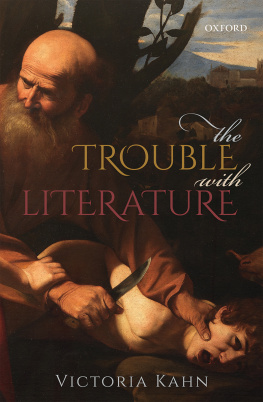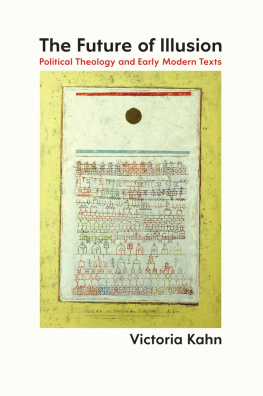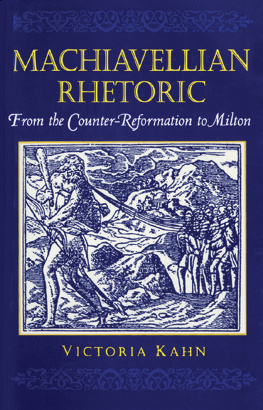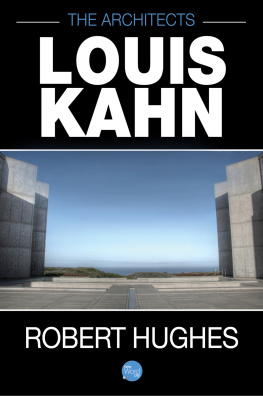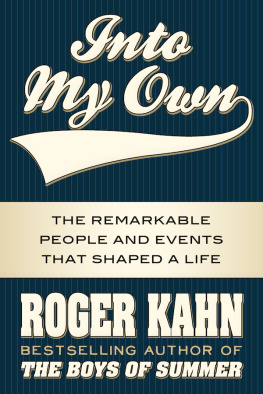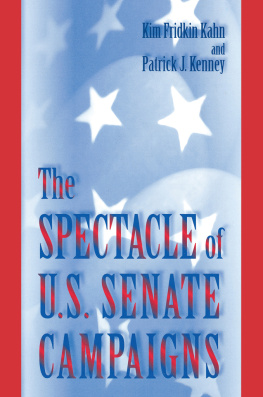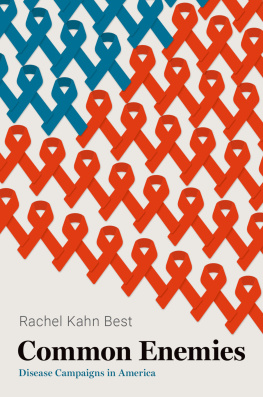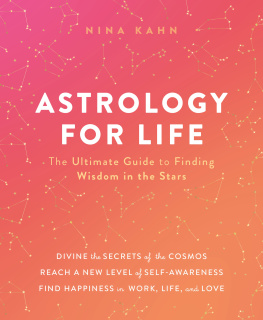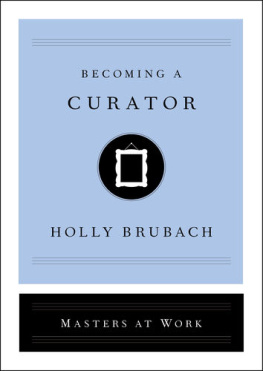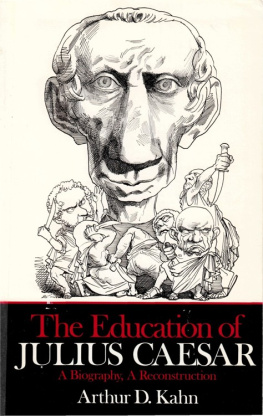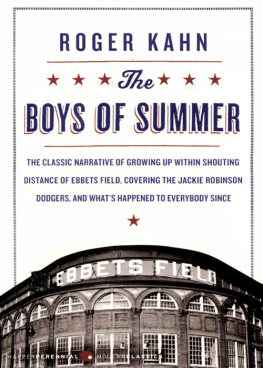Victoria Kahn - The Trouble with Literature
Here you can read online Victoria Kahn - The Trouble with Literature full text of the book (entire story) in english for free. Download pdf and epub, get meaning, cover and reviews about this ebook. year: 2020, publisher: OUP Oxford, genre: Romance novel. Description of the work, (preface) as well as reviews are available. Best literature library LitArk.com created for fans of good reading and offers a wide selection of genres:
Romance novel
Science fiction
Adventure
Detective
Science
History
Home and family
Prose
Art
Politics
Computer
Non-fiction
Religion
Business
Children
Humor
Choose a favorite category and find really read worthwhile books. Enjoy immersion in the world of imagination, feel the emotions of the characters or learn something new for yourself, make an fascinating discovery.
- Book:The Trouble with Literature
- Author:
- Publisher:OUP Oxford
- Genre:
- Year:2020
- Rating:3 / 5
- Favourites:Add to favourites
- Your mark:
- 60
- 1
- 2
- 3
- 4
- 5
The Trouble with Literature: summary, description and annotation
We offer to read an annotation, description, summary or preface (depends on what the author of the book "The Trouble with Literature" wrote himself). If you haven't found the necessary information about the book — write in the comments, we will try to find it.
The Trouble with Literature — read online for free the complete book (whole text) full work
Below is the text of the book, divided by pages. System saving the place of the last page read, allows you to conveniently read the book "The Trouble with Literature" online for free, without having to search again every time where you left off. Put a bookmark, and you can go to the page where you finished reading at any time.
Font size:
Interval:
Bookmark:


Great Clarendon Street, Oxford, OX2 6DP, United Kingdom
Oxford University Press is a department of the University of Oxford. It furthers the Universitys objective of excellence in research, scholarship, and education by publishing worldwide. Oxford is a registered trade mark of Oxford University Press in the UK and in certain other countries
Victoria Kahn 2020
The moral rights of the author have been asserted
First Edition published in 2020
Impression: 1
All rights reserved. No part of this publication may be reproduced, stored in a retrieval system, or transmitted, in any form or by any means, without the prior permission in writing of Oxford University Press, or as expressly permitted by law, by licence or under terms agreed with the appropriate reprographics rights organization. Enquiries concerning reproduction outside the scope of the above should be sent to the Rights Department, Oxford University Press, at the address above
You must not circulate this work in any other form and you must impose this same condition on any acquirer
Published in the United States of America by Oxford University Press
198 Madison Avenue, New York, NY 10016, United States of America
British Library Cataloguing in Publication Data
Data available
Library of Congress Control Number: 2019946477
ISBN 9780198808749
ebook ISBN 9780192536242
DOI: 10.1093/oso/9780198808749.001.0001
Printed and bound in Great Britain by Clays Ltd, Elcograf S.p.A.
Links to third party websites are provided by Oxford in good faith and for information only. Oxford disclaims any responsibility for the materials contained in any third party website referenced in this work.
This book consists of the Clarendon Lectures in English Literature, which I gave at Oxford in the fall of 2017. I am grateful to the English Faculty at Oxford for the invitation, and to Lorna Hutson and Ros Ballaster for their hospitality during my visit. I have preserved the lecture format as much as possible, including its brevity and informality, and I have tried to keep quarrels with other scholars at a minimum. I took my brief to be to ask the most important question I could about the disciplinewhat makes something literary?and to reflect on this question in my capacity as a scholar of the English Renaissance. I dont pretend to have answered this question to my entire satisfaction. In fact, its a premise of these lectures that the question is permanently troublesome. But the lectures will have succeeded if they prompt others to test some of my hypotheses on other texts of the early modern period, and of other periods as well.
In writing these lectures, I have been mindful of the bemused objection of a colleague in History that literary scholars are in the habit of making large claims about epochal historical shifts with reference to a handful of literary texts. This is undoubtedly the case here as well. In some places, the argument I make proceeds by synecdoche, as when Sidney, Shakespeare, and Jonson stand for the secular literary production of the English Renaissance. In other casesfor example, those of Hobbes and Miltonmy goal is to show what it was possible to think in the mid-seventeenth century, and the startling conclusions it was possible to draw from the confluence of Renaissance humanism and Reformation theology. Hobbes and Milton are the fulcrum between the earlier literary culture of the sixteenth century and the rise of aesthetics in the eighteenth century. This is the case not because they are representative of their timeto the contrary, they are quite exceptional. But their very exceptionality helps us understand in a quasi-allegorical fashion what it means to move from a culture in which religious belief is a gift of God to one in which it becomes possible to imagine such belief as an artifact of human making, a made thing. In both cases, I argue, this reimagining of belief was aided and abetted by the literary and rhetorical culture of Renaissance humanism. The last lecture takes up the topic of literariness after the Renaissance, and focuses on what will strike many as an odd trioKant, Kierkegaard, and J. M. Coetzee. Here too the figures function synecdochically for three different views of the relationship between literary making and believing: Kant for the German idealist tradition of aesthetics, Kierkegaard for the relevance of the literary for rethinking belief in the bright light of German idealism, and Coetzee for the fate of the belief in literature in our own time.
Writing these lectures has been a great pleasure, not least of all because of my conversations with the many friends who helped to make them better. I am particularly grateful to Lorna Hutson, who divined the heart of the argument and helped me stick to it. I owe an immense debt to Annabel Patterson, who went over the lectures with a fine-toothed comb, helped me to see what they were really about, and urged me to address a wider public. I have stolen many of her good ideas and tried to live up to her high rhetorical standards. I am profoundly grateful as well to Dori Hale, who read all the lectures with care and gave me comments that were detailed, exacting, and extraordinarily generous; and to Jeffrey Knapp, for his encouragement and probing criticism. At a late stage of revision, Rachel Eisendrath intervened with surgical precision to help me clarify my argument and to challenge some of its assumptions. To all these friends, I am happily indebted.
For comments on individual chapters, I thank Alan Tansman, Ethan Shagan, David Marno, David Bates, Kinch Hoekstra, Jonathan Sheehan, Joshua Scodel, David Quint, Jane Tylus, James Martel, James Turner, Dora Zhang, and Charles Altieri. Alex Walton was a research assistant of remarkable resourcefulness and lightning speed, whose labors greatly facilitated the process of editing and revision. I am grateful to Kathy Eden for her friendship, her work, and a helpful discussion of Quintilian on argumentum; to Louise George Clubb for her interest and encouragement; to Hannah Ginsborg for several conversations about Kant; to Maura Nolan for her knowledge of medieval literature; to Eric Naiman, for an exchange about Russian formalism; to Dori Hale, again, for conversations about fiction and the novel; to George Starr for a spirited email exchange about belief and knowledge; to my editors at OUP, Jacqueline Norton and Eleanor Collins, for their support; and, especially, to Marsha Silverberg, whose unplanned transatlantic flight literally made the lectures possible. To Helene Silverberg, who deserves her own sentence, I owe everything else.
Photo: The Museum of National History.
Photo: Vladimir Terebenin.
I want to begin with an anecdote that is telling about the discipline of literary studyor at least was for me when I was first starting out. When I was a first-year graduate student at Yale in the 1970s, it was an affectation of the more advanced students to perform their intellectual seriousness by saying that they were troubled by some aspect of a literary text. The moment Im thinking of occurred in a seminar on Romanticism led by the late Geoffrey Hartman. We were reading Coleridges mysterious poem,
Font size:
Interval:
Bookmark:
Similar books «The Trouble with Literature»
Look at similar books to The Trouble with Literature. We have selected literature similar in name and meaning in the hope of providing readers with more options to find new, interesting, not yet read works.
Discussion, reviews of the book The Trouble with Literature and just readers' own opinions. Leave your comments, write what you think about the work, its meaning or the main characters. Specify what exactly you liked and what you didn't like, and why you think so.

